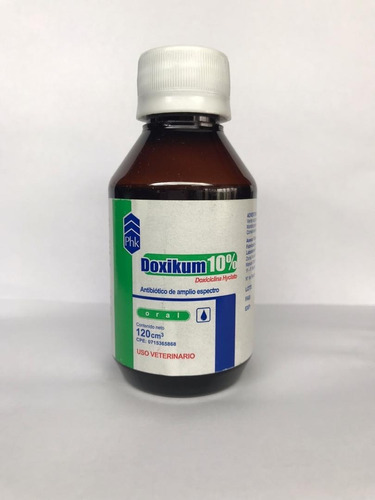Doxikum
Precautions
Pregnancy: Doxycycline should be used with caution in pregnant animals, as it can cross the placental barrier and affect fetal development. Doxikum
Young animals: Should be used carefully in young animals due to the potential impact on teeth and bone development.
Renal or hepatic impairment: Animals with compromised kidney or liver function should be monitored closely when using Doxikum, as it may exacerbate these conditions.
Withdrawal Periods (For Food-Producing Animals)
If Doxikum is used in livestock intended for human consumption, strict withdrawal periods must be observed to ensure that no antibiotic residues remain in meat or milk:
Meat withdrawal: Typically, there is a withdrawal period of 14-28 days after the last treatment before the animal can be slaughtered.
Milk withdrawal: A withdrawal period of 5-10 days is generally required before milk from treated animals can be consumed.
Contraindications
Known Hypersensitivity: Animals with a known allergy to doxycycline or other tetracyclines should not be given Doxikum.
Concurrent use with other antibiotics: Doxycycline should not be used concurrently with bactericidal antibiotics like penicillins, as these may antagonize the effects of doxycycline.
Doxikum and Doxikum 10 are powerful antibiotics that treat a wide range of bacterial infections in various animals, particularly in horses and livestock. Their broad-spectrum action makes them valuable tools in veterinary medicine, especially for respiratory, gastrointestinal, and soft tissue infections. Proper dosing, administration, and monitoring are essential to ensure effective treatment and prevent the development of antibiotic resistance.
Key Points:
Active Ingredient: Doxycycline, a broad-spectrum antibiotic.
Administration: Can be given as an injection or orally, depending on the formulation.
Indications: Used for respiratory infections, gastrointestinal infections, and soft tissue infections.
Side Effects: Include gastrointestinal upset, photosensitivity, and liver/kidney concerns.
Withdrawal Periods: Required for meat and milk from treated animals to prevent antibiotic residues in food products.
Always consult with a veterinarian before using Doxikum to ensure it is appropriate for the specific infection and the animal’s condition.
Doxikum 10
Doxikum and Doxikum 10 are veterinary medications that contain doxycycline, an antibiotic belonging to the tetracycline class. These drugs are primarily used to treat bacterial infections in animals, especially in horses, cattle, and other livestock.
What is Doxikum?
Doxikum is an antibiotic medication used in veterinary medicine to combat a range of bacterial infections. Its active ingredient is doxycycline, which is a broad-spectrum antibiotic effective against both Gram-positive and Gram-negative bacteria. Doxycycline works by inhibiting protein synthesis in bacteria, preventing them from growing and multiplying.
What is Doxikum 10?
Doxikum 10 refers to a specific formulation of Doxikum, where the “10” usually indicates the concentration of the doxycycline in the product, typically 10%. It may be available as an injectable solution or oral powder, depending on the formulation and intended use.
Uses of Doxikum and Doxikum 10 in Veterinary Medicine
These medications are used to treat a wide range of bacterial infections in animals. Common uses include:
Respiratory Infections: Doxikum is effective in treating bacterial infections in the respiratory system, such as pneumonia or bronchitis.
Urinary Tract Infections: Used to combat urinary infections caused by susceptible bacteria.
Gastrointestinal Infections: Treatment of bacterial enteritis and other gastrointestinal infections.
Soft Tissue Infections: Used to treat wounds, abscesses, and other soft tissue infections in animals.
Reproductive Infections: It can also be used to treat infections of the reproductive tract in animals.
Doxikum is particularly useful in treating infections caused by Mycoplasma, Rickettsia, Chlamydia, and Spirochetes.
Dosage and Administration
The dosage of Doxikum or Doxikum 10 depends on the species being treated, the severity of the infection, and the specific formulation being used (injectable or oral). It is essential to follow the veterinarian’s prescription to ensure proper treatment.
Common Dosage Guidelines:
Cattle and Horses: Typically, doxycycline is administered at a dose of 5-10 mg/kg of body weight per day. The exact dosage can vary depending on the severity of the infection and the formulation used.
Dogs and Cats: Smaller animals are typically given a dosage of 5 mg/kg twice daily.
Administration:
Injectable: Doxikum 10 can be administered via injection, commonly intramuscular (IM) or subcutaneous (SC).
Oral: Doxikum can also be administered as an oral powder, usually mixed with feed or water, depending on the animal species.
Mechanism of Action
Doxycycline inhibits bacterial protein synthesis by binding to the 30S ribosomal subunit of the bacteria. This action prevents the bacteria from producing essential proteins, halting their growth and reproduction. As a result, the bacteria are unable to proliferate, and the body’s immune system can eliminate the remaining bacteria.
Spectrum of Activity
Doxikum is effective against a wide variety of bacteria, including:
Gram-positive bacteria: Staphylococcus, Streptococcus, Bacillus, and Listeria.
Gram-negative bacteria: Escherichia coli, Salmonella, Pasteurella, and Haemophilus.
Mycoplasma species: Often responsible for respiratory infections in livestock.
Spirochetes: Including Borrelia (causes Lyme disease) and Leptospira.
Rickettsia and Chlamydia: Intracellular bacteria causing specific types of infections.
Side Effects
While Doxikum is generally well-tolerated, there are potential side effects to be aware of, particularly with long-term use or in high doses:
Common Side Effects:
Gastrointestinal upset: Diarrhea, nausea, or vomiting may occur, especially when administered orally.
Photosensitivity: Increased sensitivity to sunlight, particularly in animals exposed to prolonged sunlight.
Liver and kidney toxicity: High doses or prolonged use may cause stress on the liver and kidneys.
Allergic reactions: Although rare, some animals may experience allergic reactions to doxycycline, which can manifest as skin rashes or difficulty breathing.
Teeth and bone effects: In younger animals, prolonged use of doxycycline can affect bone development or cause yellowing of teeth.




Reviews
There are no reviews yet.